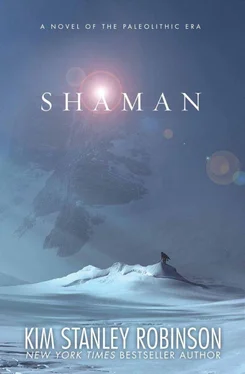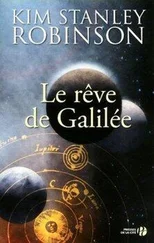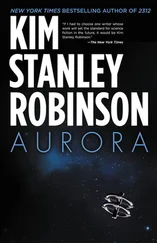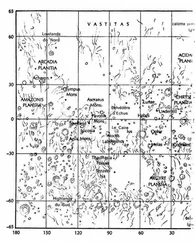Kim Robinson - Shaman
Здесь есть возможность читать онлайн «Kim Robinson - Shaman» весь текст электронной книги совершенно бесплатно (целиком полную версию без сокращений). В некоторых случаях можно слушать аудио, скачать через торрент в формате fb2 и присутствует краткое содержание. Город: New York, Год выпуска: 2013, ISBN: 2013, Издательство: Orbit, Жанр: Фантастика и фэнтези, Историческая проза, на английском языке. Описание произведения, (предисловие) а так же отзывы посетителей доступны на портале библиотеки ЛибКат.
- Название:Shaman
- Автор:
- Издательство:Orbit
- Жанр:
- Год:2013
- Город:New York
- ISBN:9780316235570
- Рейтинг книги:4 / 5. Голосов: 1
-
Избранное:Добавить в избранное
- Отзывы:
-
Ваша оценка:
- 80
- 1
- 2
- 3
- 4
- 5
Shaman: краткое содержание, описание и аннотация
Предлагаем к чтению аннотацию, описание, краткое содержание или предисловие (зависит от того, что написал сам автор книги «Shaman»). Если вы не нашли необходимую информацию о книге — напишите в комментариях, мы постараемся отыскать её.
From the New York Times bestselling author of the Mars trilogy and 2312 comes a powerful, thrilling and heart-breaking story of one young man's journey into adulthood -- and an awe-inspiring vision of how we lived thirty thousand years ago.
Shaman — читать онлайн бесплатно полную книгу (весь текст) целиком
Ниже представлен текст книги, разбитый по страницам. Система сохранения места последней прочитанной страницы, позволяет с удобством читать онлайн бесплатно книгу «Shaman», без необходимости каждый раз заново искать на чём Вы остановились. Поставьте закладку, и сможете в любой момент перейти на страницу, на которой закончили чтение.
Интервал:
Закладка:
The river was alive, they could hear it throbbing. Under its white blanket of snow, under the bare ice shelving over it, it pushed up, it surged with the spring melt. They could see snow and ice shifting in places, and sudden bucklings where ice tipped up blinking in the sun, or lines of new plates cracked upright as if stitched by invisible sinews. Water sheeted out of these seams, bluing the ice downstream into little skyblinks.
Thorn sang hoarsely, danced without moving his feet, suggesting the dance without actually doing it. Speaking to the sky. The river boomed back. It was loud both upstream and down. But the break-up didn’t come.
They all knew that ice in this condition would sometimes hang on for days, holding on for fist after fist, day after day, until the break-up finally happened and it all rushed downstream on a violent spate of black water. It was the river’s summer orgasm, a spurt glorious to see. Never before had they cared exactly when it happened. Now, watching it hold despite all, they were in an agony of suspense. Possibly with a river this big, despite all its crashing and snapping, it would take a long time. And now, across the river, far to the northwest, Loon saw dots moving. He pointed them out.
Thorn stopped his dance.—Come on, he said grimly.—Fuck the gods. We have to go.
Loon groaned like the river. He stood and tested Badleg. Still bad. He put his sack on his shoulders, which were sore where the straps ran.
Off they went.
Chapter 47
Now their run took them uphill, into the afternoon sun. The glare of the sun’s blaze off the wet snow ahead made Loon squint until his eyes were almost closed. It felt like his whole body was squinting, and he had to push forward into the blast of light.
But they kept their pace. Loon found his way back into his second wind, uphill or not. Badleg felt much better going uphill. Loon put his snowshoes right in the tracks left by Click and Thorn; Click almost always stepped in Thorn’s tracks, so that it almost looked like a single person’s track. When the two sets of tracks separated, Loon began to follow Click’s, as having harder snow at their bottoms; then also, as he began to see why Click had deviated from Thorn’s tracks, consistently keeping to a higher line, he chose that way to smooth his own ascent. It occurred to Loon at one point that he could understand more of Click’s thinking by looking at his tracks in the snow than he ever had by talking with him.
Elga stayed close on his heels. She looked thirsty, and hiked head down, eyes almost shut, fitting her snowshoes carefully into the tracks before her.
Thorn headed for a black hill that popped over the white horizon. As they closed on it, moving more slowly as the snow softened, they could see it was the start of a line of hills that ran south, forming the western ridge of a valley which seemed to be the valley Loon and Elga had come down when the jende had taken them north. It was hard to be sure.
Thorn wanted to run this ridge, so they would stop leaving tracks in the snow. As they got farther south there would be even more snow-free ground, he said, and with luck they would be able to get off the ridge somewhere without leaving any sign, and then keep going tracklessly from there. Loon and Elga nodded and put their heads down again, followed Thorn and Click toward the bare hill.
When they got to the hill’s first rise of rock out of snow, however, it became obvious that the ridge was not going to be as easy to hike on as the snowy plain had been. Even getting onto the ridge in the first place involved kicking steps up steep snow to where it met a ramp of rock that would get them on the ridge. Any extra effort now was difficult to give, and Loon could feel cramps sparking in his calves. But it was crucial to get off the snow, so they grunted and hissed and clicked through the necessary steps. The snow next to the rock was especially rotten; one had to be careful not to crash down into a covered gap. Sometimes one step was all it would take. Eyes burning with sweat, Loon struggled to move up in the slush, which pulsed blackly at the edges of its whiteness.
Finally they stood panting and sweating on the edge of the ridge, with an upward walk ahead, and a prospect behind them that extended all the way back to the big river. Lots of snow back that way, but ahead of them, to the south, there was a lot of black patching the suncupped white. Ah yes: they were almost to the steppes, to the edge of the land they knew, where they could run the ridge trails, and melt into the canyon forests with all the rest of their animal brothers and sisters. They sat down and took off their snowshoes, tying them to the backs of their backsacks.
But Click pointed: there the ice men were, little black dots crossing the snowy plain, having crossed the big river. From here the river was still white and noiseless, although as far west as they could see, it was black. But the jende had gotten across, and were still following them. One thing Thorn pointed out was interesting: the captive wolves seemed to be gone. Either they had been taken back, or they had escaped. Thorn liked that thought. But it was also obvious, watching the little black dots, that the jende were the wolves now, or the hyenas, or ravens, or people; they were any of the hunters who followed prey until it was exhausted, then moved in for the kill. Ravens even led wolves or humans to injured animals they had spotted from the air, to be able to scavenge what was left after the hunters killed and ate it.
Loon had never been hunted in this manner. Possibly none of them had been; although when he saw Click’s face looking back at the jende, he saw that the old one had lived this before, and was not surprised. Click hummed something short to himself, regarded Thorn and Elga and Loon curiously. He made a gesture with his head: time to go?
Thorn continued to stare at the dots, shading his eyes with a hand. Finally he heaved a big breath in and out.
—Let’s see what this ridge can do for us. They have to be getting tired too. If they come up the ridge and don’t see us, never see us again, with no tracks to follow, they won’t know where we got off the ridge. They’ll give up.
Click mimed eating, inspected his empty hand.
—I know, Thorn said to him.—Second wind.
—I’ve already had my second wind, Loon said.
Thorn regarded him.—Third wind then. Sometimes it has to happen. And this is one of those times.
He smiled a tight little smile.—This is what we live for! Days like this! So come on.
Chapter 48
The broad edge of the ridge of hills was indeed harder in some ways to hike on than the snow had been, but it was good to be off snow too, to have secure footing again. There were still snow patches on the ridge, and big slopes of it below them to right and left, but they tried to avoid them all, wending their way from rock to rock.
The ridge went up and down in the usual way, but always a bit more up than down. Sometimes the ridge edge itself narrowed. Mostly it was a broad broken path of black lichenous rock, twenty paces wide or more, but in places it narrowed to a blade of an edge no wider than their feet, with steep drops to both sides. Loon got down on his hands and knees and crawled along these parts, as he didn’t trust Badleg to hold him. Sometimes the other three crawled too.
Happily the ridge widened as it got higher, and side ridges began to branch down to both east and west, containing steep little kolby canyons that they looked down into as they passed; these were still snow-choked. Thorn wanted to drop into one of them, if it was possible to stay on dry land or gritrime once down, but none of the canyons offered that. They did have trees, however. The avalanche gullies were snowy chutes, but otherwise the canyon sides were getting more and more forested. Under the trees the ground was still snowy, but the creeks were often open black water. Ground in the sun all day was often free of snow, the black ground steaming between the rocks. The steep slopes to each side steamed to a palpable mist as they hiked the ridge looking for a good way down.
Читать дальшеИнтервал:
Закладка:
Похожие книги на «Shaman»
Представляем Вашему вниманию похожие книги на «Shaman» списком для выбора. Мы отобрали схожую по названию и смыслу литературу в надежде предоставить читателям больше вариантов отыскать новые, интересные, ещё непрочитанные произведения.
Обсуждение, отзывы о книге «Shaman» и просто собственные мнения читателей. Оставьте ваши комментарии, напишите, что Вы думаете о произведении, его смысле или главных героях. Укажите что конкретно понравилось, а что нет, и почему Вы так считаете.











